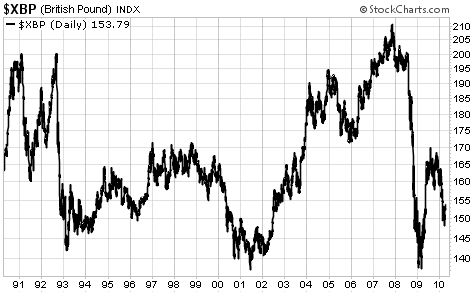| Home | About Us | Resources | Archive | Free Reports | Market Window |
Britain's Giant Property BubbleBy
Tuesday, April 13, 2010
My friend lives in a popular neighborhood in London. When I asked him about housing prices in his neighborhood, he said they've been rising all year. They're now breaking the records set in the great housing boom that ended in 2007.
London had the biggest housing bubble on the planet. The average London house price quadrupled between 1996 and 2006. Now the average house in London sells for $436,000. That's only 9% lower than the all-time record set in 2007… and it's higher than 2006 prices.
"The London real estate bubble, arguably the biggest one of all, still hasn't popped," wrote the Wall Street Journal two months ago.
My friend trades derivatives for a living in London's financial district. With house prices rising, I figured the confidence must have returned to his trading floor…
"It's weird," he said. "The trading floor is quiet. It's like a lot of traders are passing time and there aren't many deals being done."
How could house prices be rising and my friend's trading floor be sluggish at the same time? I have an explanation. The British government is devaluing the currency...
In terms of debt, Britain is in the same position as Greece, Spain, Portugal, and Ireland. It's broke and struggling to pay back what it owes. There's one difference. Britain has its own currency, and unlike these other European countries, the British government can intentionally devalue this currency in order to ease the pain of Britain's recession...
For one thing, a cheaper pound makes British goods cheaper for foreigners, so British factories have more work and more tourists come to Britain. It also makes British debt more manageable. Debtors can pay back their debts in devalued currency. It's like borrowing an ounce of gold and being allowed to pay it back with an ounce of silver.
Britain's already implemented this strategy. Right now, the British currency, the pound sterling, is near its lows of the last 20 years against the dollar and the euro... and there's no sign it's going to stabilize...
 This "devaluation" policy is making the prices of basic goods and services rise.
I was last here in early 2007. One thing I've noticed is since then, prices for basic items like food, drink, newspapers, gasoline, public transportation, and cigarettes have soared. These items seem to have gained almost 25% in price in three years.
While devaluation is causing prices of basic goods and property to rise, it's not generating true economic activity. This is why my friend's trading floor is still quiet.
Currency devaluation is one of the oldest tricks in the government economic "hand book." Take the 1990s as an example. The Mexicans, Brazilians, Argentines, Russians, and several Asian countries used currency devaluation to ease debt burdens.
Now the Brits are using the same tactic. In London's financial district, currency traders now joke that GBP stands for "Gordon Brown's peso" instead of "Great Britain's pound."
It's easing the burden of their recession, but causing prices to rise. For now, rising property prices are not a problem so I don't see any reason for the country to stop inflating. Bottom line, the pound will continue to fall and property prices will continue rising.
If I were living in Britain right now – or any other country intentionally devaluing its currency – I'd convert some of my savings into U.S. dollars… and I'd also buy a few gold coins.
Good investing,
Tom Dyson
Further Reading:
Britain isn't the only major country devaluing its paper currency in order to pay off debts. Make sure to read about the biggest devaluation in Steve's recent The NEW Greatest Trade Ever essay.
Tom's been in London for almost two weeks. No matter where Tom travels, he's always on the lookout for profitable ideas for DailyWealth readers. Here is a classic essay Tom wrote while he was traveling across Asia back in August 2008: Where to Find the Money in Asia.
Market NotesONE OF THE WORST BEAR MARKETS IN THE WORLD With oil, base metals, gold, and stocks of all stripes climbing, it's almost impossible to find a bear market right now…
Almost impossible if you aren't watching the brutal bear market in today's chart… the bear market in volatility.
Professionals keep a close eye on market volatility with an indicator called the "VIX." This is a gauge of how much traders and investors are willing to pay for portfolio insurance in the form of protective stock options. The VIX also measures investor fear. The higher the VIX, the higher the level of fear in the marketplace.
During the late 2008 credit crisis, folks got as scared as they have been in generations. The VIX spiked to an incredible "Armageddon" reading over 80. But thanks to the government's enormous E-Z-Credit bailout program, investors are piling back into stocks, commodities, and real estate… the Dow is up almost everyday… and folks are letting the other guy worry about risk. As any seasoned investor will tell you, when nobody is worried about risk, it is precisely the time everyone should be worried about risk.
|
In The Daily Crux
Recent Articles
|

